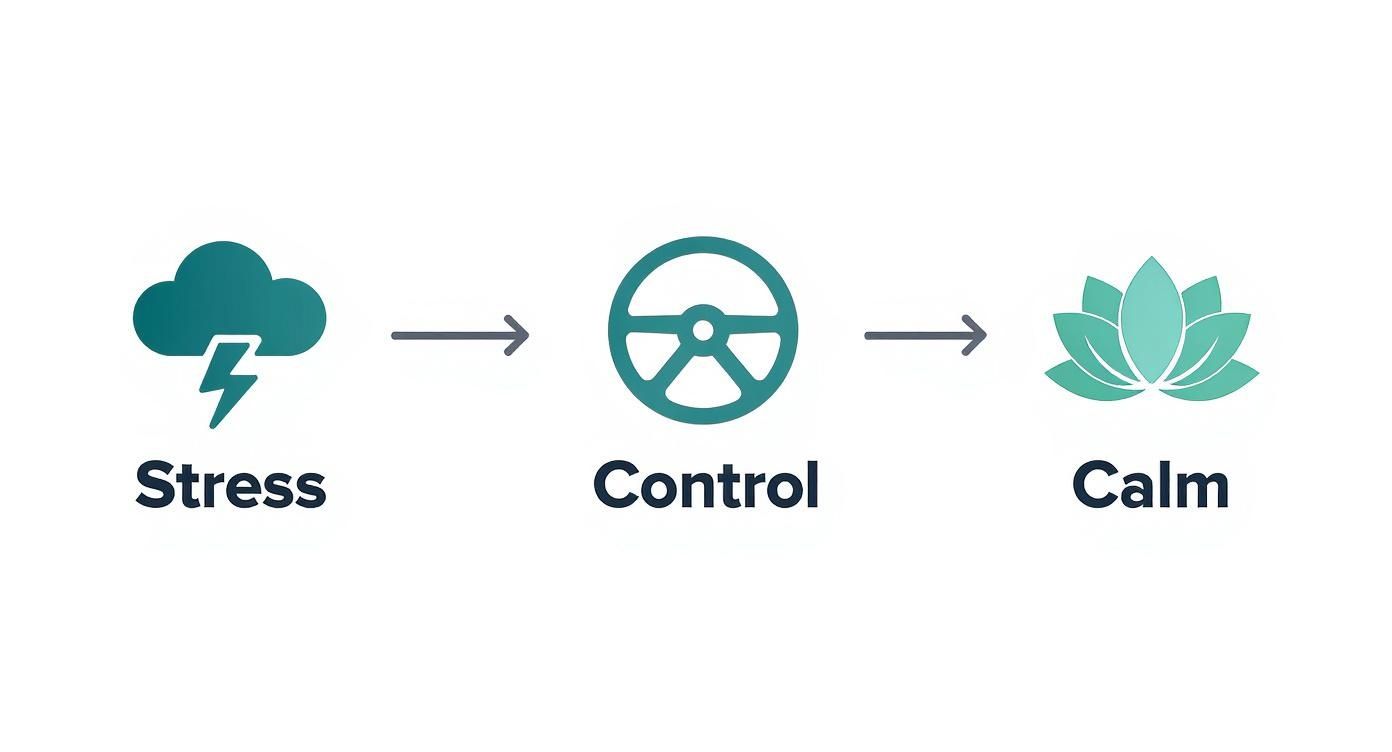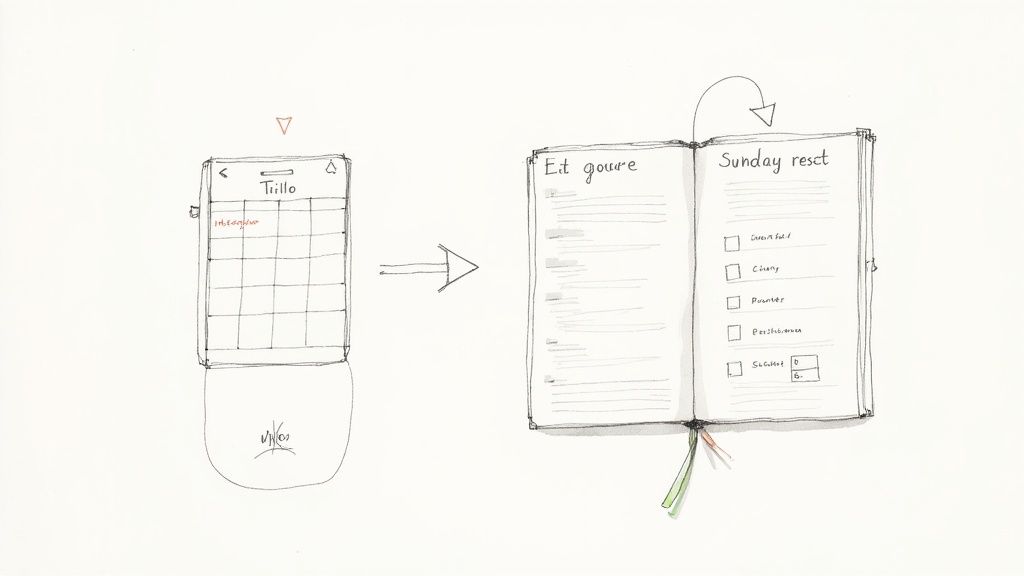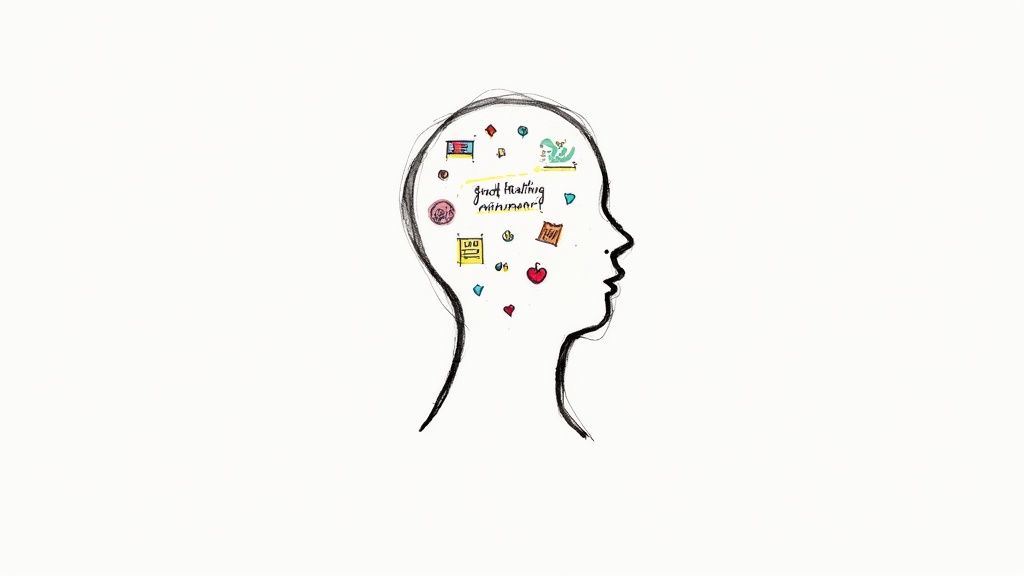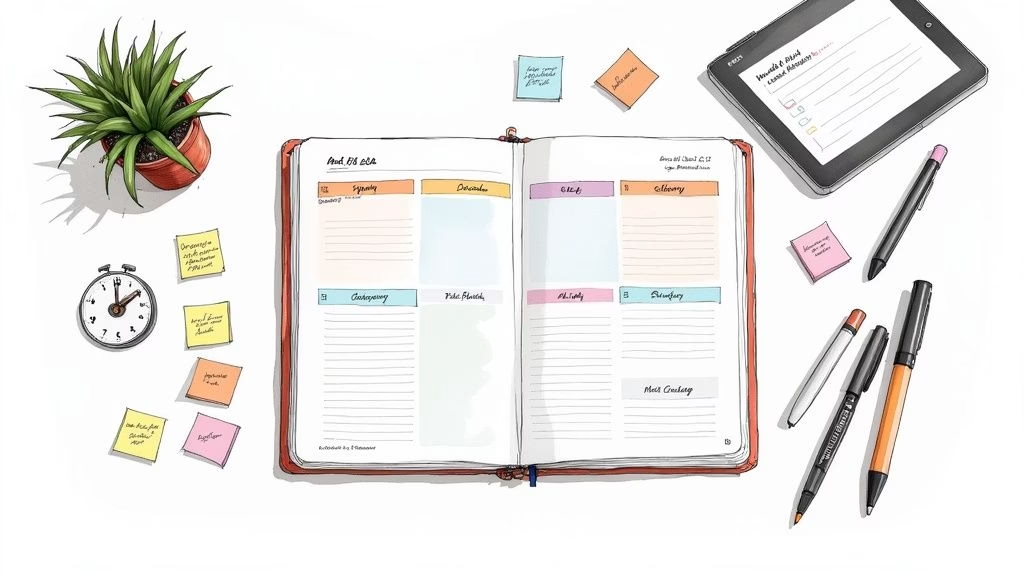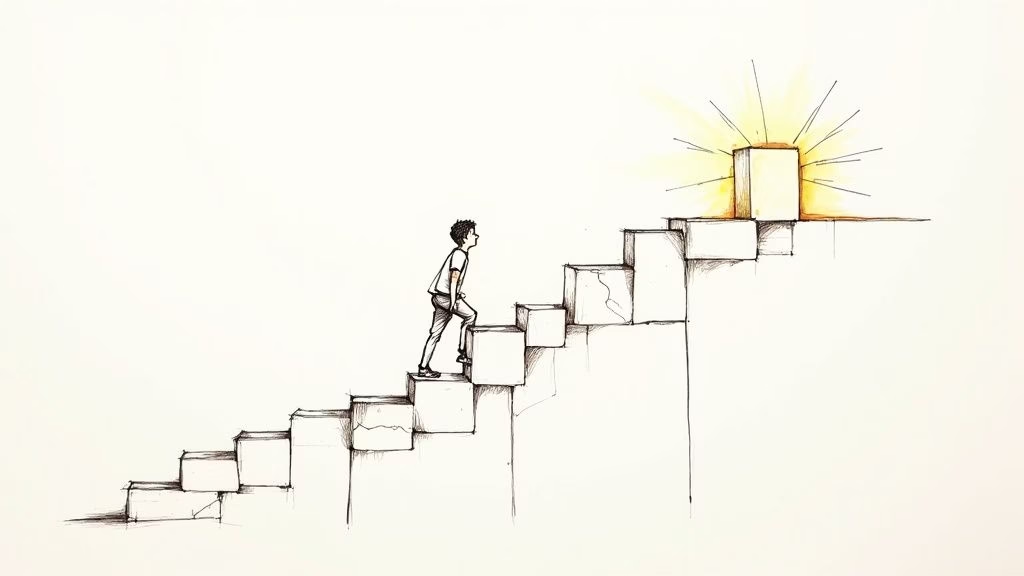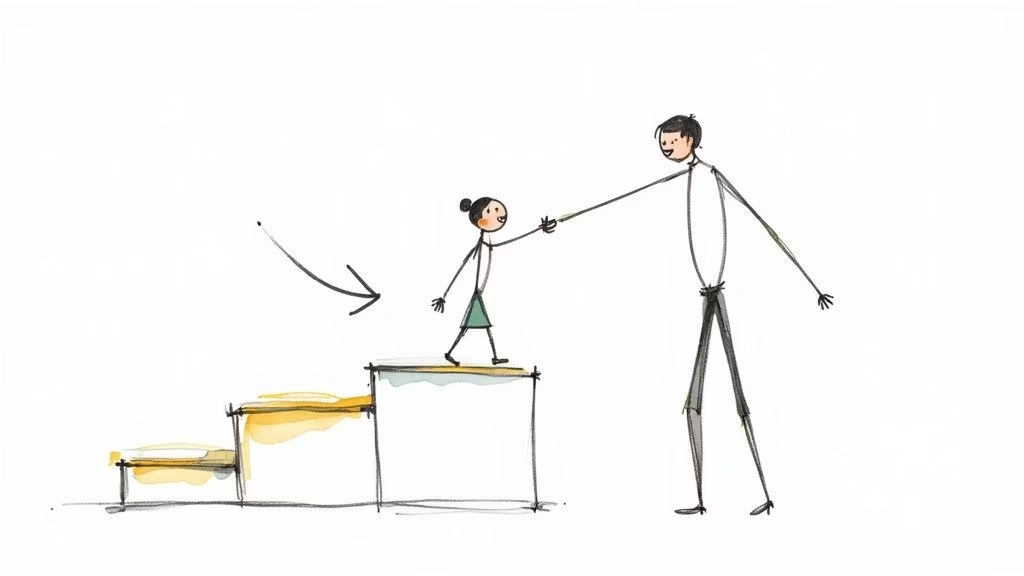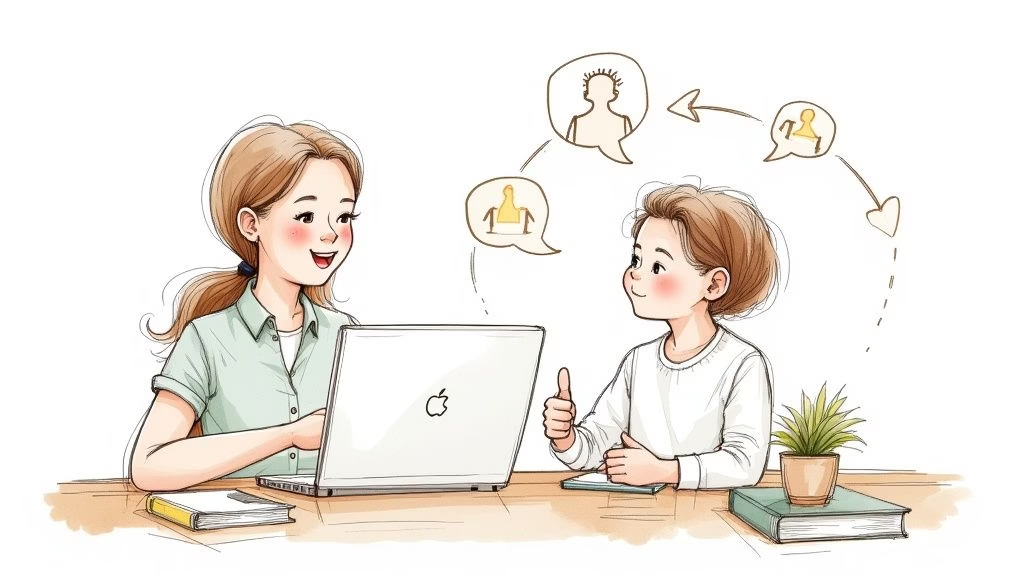Let's be real for a second. The phrase "getting organized" probably makes you want to close this tab. It conjures up images of perfect, color-coded calendars and folders that seem like they were made for someone who isn't you.
But what if we looked at it differently? What if organization wasn’t about being perfect, but about clearing out the mental noise so you can actually relax and focus on what you want to do?
For a lot of guys, the pressure is on. You're juggling school, friends, family, and thinking about what's next. It's a recipe for feeling completely overwhelmed. This is where getting a handle on your organizational skills isn’t just a chore—it’s a secret weapon. It’s not about becoming a different person; it’s about finding the right systems to manage the chaos.
The Real Link Between Clutter and Your Mind
Ever notice how a messy backpack or a desktop full of random files makes your brain feel… slow? That’s not in your head. The connection between a cluttered space and a cluttered mind is very real.
When your stuff is all over the place, your brain has to work overtime just to find what it needs. That little bit of extra effort drains your mental battery, which is often what leads to procrastination. Suddenly, that big history project feels ten times harder to start. The goal isn’t a spotless desk—it’s to quiet the background noise so you can actually think.
A disorganized environment can feed into feelings of anxiety and helplessness. Taking small, manageable steps to organize your physical and digital spaces gives you a sense of control back, and that’s a powerful antidote to stress.
You Don't Have to Figure This Out Alone
It's also important to call out that guys are often told to just "deal with it" when it comes to stress or motivation struggles. But asking for help or finding a good system isn't a weakness—it's a sign of strength.
There are great resources out there. The Jed Foundation offers real-deal mental health support for teens, and communities like The Man Cave are creating spaces for young men to connect without the usual pressures.
This is a big one for parents, too. Instead of just demanding a clean room, a better approach is to work with your son to build a system that actually makes sense for him. It's about collaboration, not conflict. That approach builds skills and confidence, which are the real keys to a less stressful, more organized life.
Conquer Your To-Do List and Beat Procrastination
That feeling of staring at a massive to-do list and not knowing where to start? It's paralyzing. That sense of dread is usually the real root of procrastination, especially with schoolwork. It’s not about being lazy—it’s a stress response when you feel completely overwhelmed. The only way to move forward is to break that cycle and take back control, one small step at a time.
This is where having a few solid techniques in your back pocket makes all the difference. Instead of just hoping you’ll find the time, you learn how to create it. Think about it: project managers using time-blocking tools have seen a 30% reduction in missed deadlines. You can apply that same logic to your homework and build a powerful habit for the future.
Starting your day with a clear plan can also shift everything. Something as simple as a practical school morning routine checklist can help you begin with intention instead of chaos.
The infographic below shows how changing your approach to organization can shift your mindset from stressed out to calm and in control.
Here's the key insight: organization isn't just about being neat. It's a tool that helps you regain control, which is what actually reduces stress and improves your focus.
Build Momentum with Simple Techniques
You don’t need some ridiculously complex system to get started. The goal is just to build a little momentum. One of the most effective ways to do that is with the Pomodoro Technique. It's simple: you use a timer to break your work into focused chunks, usually 25 minutes, with short breaks in between.
This little trick works wonders for a few reasons:
- It feels way less intimidating. Committing to just 25 minutes of work is a lot easier than facing a three-hour study marathon.
- It actually trains your focus. Working in short sprints teaches your brain to stay on task without getting pulled away by distractions.
- You get built-in rewards. Those short breaks act like mini-rewards that keep you motivated and prevent burnout.
If you want to dig deeper into the mental side of just getting started, check out my guide on https://andrewpetrillolifecoaching.com/how-to-stop-procrastinating/.
Sometimes, you just need a straightforward method to get your thoughts organized. Here’s a quick comparison of a few simple techniques that can help you manage your time without overcomplicating things.
Simple Time Management Techniques for Teens
| Technique | Best For | How It Works |
|---|---|---|
| The Pomodoro Technique | Beating procrastination and staying focused on one task at a time. | Work in focused 25-minute intervals, separated by 5-minute breaks. After four "Pomodoros," take a longer break (15-30 minutes). |
| Time Blocking | Visually planning your entire day and protecting time for deep work. | Assign every hour of your day to a specific task or "block" in a calendar. This includes classes, homework, meals, and breaks. |
| The 2-Minute Rule | Quickly clearing small, nagging tasks off your to-do list. | If a task takes less than two minutes to complete, do it immediately instead of putting it off. |
Each of these methods offers a different way to tackle your schedule. The best one is simply the one that you'll actually use consistently. Don't be afraid to try them out and see what clicks for you.
Understand Your Mind to Stay Motivated
Motivation isn't some magical force that just shows up. It’s a direct result of your mindset and your environment. Especially for teen boys, there's often this unspoken pressure that makes it tough to admit you're feeling stuck or overwhelmed. This is where getting support and understanding your own mental health is so critical.
Procrastination is often a symptom of anxiety about not doing a task perfectly. Giving yourself permission to do a "bad first draft" or complete just one small part of a project can be enough to break the paralysis.
If you feel like anxiety is constantly getting in your way, it’s a sign of strength, not weakness, to look for help. Resources like The Jed Foundation and local teen support groups offer safe places to talk about these pressures without judgment.
For young men who are struggling to find that drive, connecting with a men's group can be a total game-changer. These groups provide a network of support where you can learn from others who have been through similar challenges, helping you build both organizational skills and personal resilience. The real goal is to build a solid foundation of mental wellness, which makes staying organized and motivated feel natural instead of like a constant battle.
Build Your Personalized Organization System
Forget what you’ve been told about the “perfect” planner or the “best” productivity app. The one-size-fits-all approach just doesn’t work. Your brain is wired differently than anyone else's, so your organizational system should be built for you.
The goal here isn't to find a single magic bullet that will instantly solve everything. It’s about experimenting to find a mix of tools and habits that makes life feel less chaotic. This means getting to know your own mind and what actually clicks for you. These skills are all tied to your brain’s management system, which is why it helps to understand a little about executive functioning and how it works.
Digital Tools Versus Physical Planners
First things first: decide on your core tools. There's no right answer here—it's about what you’ll actually use, especially on days when you have zero motivation.
- Digital Tools (Trello, Google Calendar, Todoist): These are awesome for setting reminders that pop up on your phone, working on group projects, and checking your plans from anywhere. Plus, you can move deadlines around without making a mess of your page.
- Physical Planners (Bullet Journals, Agendas): There's something powerful about physically writing things down. It can actually help you remember and commit to what you've written. And the best part? No distracting notifications—just you and the paper.
A lot of people I work with find a hybrid system works best. Maybe you use Google Calendar for all your classes and deadlines but keep a simple notebook for your daily to-do list and random ideas.
Actionable Ideas to Get Started
Building your system is all about creating simple habits you can repeat without thinking. Just start with one or two of these and see what feels right.
A simple five-minute "Sunday Reset" can completely change the tone of your week. Just take a few minutes Sunday night to glance at your calendar, jot down your top three priorities, and make sure your backpack is good to go for Monday morning.
When it comes to your digital life, things can get messy fast. To keep your files from becoming a source of stress, consider a structured approach like the P.A.R.A. method for folder structure.
Don't aim for a perfect system on day one. The best organizational system is one that evolves with you. If a tool or habit isn't working, ditch it without guilt and try something new.
Ultimately, this whole process is an act of self-respect. For young men who are feeling overwhelmed, creating structure is a powerful way to build confidence from the ground up. Resources like men's groups can also provide a solid network for sharing what works, staying accountable, and building skills that go way beyond just having a tidy desk.
Your Mental Health and Organization Toolkit
Let's be real: it's nearly impossible to organize a messy backpack when your mind feels even messier. The link between how you feel mentally and your ability to get things done is incredibly strong.
When you're overwhelmed, anxious, or just plain stressed, your brain’s motivation and planning centers can temporarily power down. This is why a simple homework assignment can suddenly feel like climbing a mountain. It’s not laziness—it’s a biological response to being overloaded.
To build organizational habits that actually stick, you first need a toolkit to support the mind that's running the show.
A Simple Mindfulness Guide for Teens
Meditation isn’t about emptying your mind. It’s about giving it one single thing to focus on so all the noise can finally quiet down. This simple practice can sharpen your focus and dial down your stress, making it way easier to tackle that to-do list.
Here’s a quick guide to get started:
- Find a Quiet Spot: Sit somewhere comfortable, whether it's a chair or the floor. You don't need a special cushion or perfect posture, just a place where you can be still for a few minutes.
- Set a Timer: Start small. Just three to five minutes. That's it. This makes it feel doable, not like another chore.
- Focus on Your Breath: Close your eyes and just notice your breath. Pay attention to the feeling of air coming in through your nose and filling your lungs.
- Gently Bring Your Mind Back: Your mind will wander. That’s what it does. When you notice your thoughts drifting to school, a text, or what's for dinner, just gently guide your attention back to your breath. No judgment. Each time you do this, you're building your focus "muscle."
The point here isn't to achieve a perfectly silent mind. It's to practice returning to a single point of focus, which is a core skill for fighting procrastination and getting organized.
Resources for When You Need More Support
Sometimes, getting organized means knowing when to ask for help with the bigger picture. Taking care of your mental health is a sign of strength, and there are some awesome resources out there specifically for teens and young men.
Struggles with motivation and organization are often tangled up with deeper feelings of anxiety or pressure. Building strong emotional regulation skills is a foundational step. If you want to dive deeper, our guide on what is self-regulation offers some practical ways to manage your emotional responses.
For teen guys who are struggling, it’s crucial to find spaces where you can be real. Men's groups and other support networks offer a powerful way to build resilience alongside peers who actually get it.
Here are a few trusted places to turn for mental health support:
- The Jed Foundation: This organization provides essential resources and support for teens and young adults navigating emotional health challenges.
- Seize the Awkward: Offers great tools and tips for starting conversations about mental health with friends, which can be a huge source of support.
- Crisis Text Line: If you're feeling completely overwhelmed and need to talk to someone right now, you can text HOME to 741741 from anywhere in the US, anytime, to connect with a trained Crisis Counselor.
Putting your mental wellness first isn't a detour from getting organized—it's the only path forward that actually lasts.
Resources for Teen Guys and Young Men
Society has a way of telling guys they need to just figure things out on their own, to tough it out. That pressure can make it feel almost impossible to talk about what’s really going on, especially when you’re feeling overwhelmed, disorganized, or just plain stuck.
But here’s the truth: asking for help and building a support system isn’t a weakness. It’s actually one of the strongest moves you can make. Taking the time to get your life in order is a massive act of self-respect. It’s you taking the wheel. And you don’t have to do it alone.
Finding Your Crew
Connecting with people who actually get what you’re going through is a game-changer. When that homework pile seems insurmountable or the pressure is just mounting, knowing you have a place to turn can make all the difference. These organizations are all about creating safe spaces for real talk, growth, and connection.
- The Man Cave: This is an incredible organization running programs focused on healthy masculinity. They create spaces where young men can connect, share what's on their minds without judgment, and build real emotional intelligence.
- Local Men's Groups: Check around your community for local or even online groups for young men. These networks can offer mentorship and peer support, helping you navigate everything from school stress to figuring out your future.
Finding a community where you can just be yourself is foundational. It gives you the solid ground you need to start working on other parts of your life, like building better habits and getting organized.
Tools for Your Mind
Let’s be real—your ability to stay organized is directly linked to your mental state. When anxiety is running high, focus is usually the first thing to fly out the window. The resources below are dedicated to providing direct support for your mental and emotional well-being.
If you feel like you’re stuck in a procrastination loop that feels deeper than just being lazy, or if you just need someone to talk to, check these out:
- The Jed Foundation (JED): JED offers fantastic, straightforward mental health resources specifically for teens and young adults. Their site has practical tips for managing your emotional health and navigating life's ups and downs.
- HeadsUpGuys: This is a resource built specifically for men's mental health. It offers practical tools, info, and personal stories to help manage and prevent depression.
And don’t forget the simple stuff. Seriously. A short daily meditation can do wonders for stress and focus. Apps like Headspace or Calm have guided meditations designed for teens that are super easy to follow. They can help quiet a racing mind, making it way easier to actually tackle that to-do list.
A Guide for Parents Supporting Their Teen
Figuring out how to support your teen without taking over is a tricky balance. The real goal is to be their coach, not their manager. You’re there to guide them as they build their own systems, not to run the show for them. It’s all about helping them find their own footing and build lasting confidence.
This whole process has to start with a real conversation. Instead of just laying down the law, invite them to talk about what’s feeling overwhelming. That messy room or that missed assignment? It’s usually a sign of something bigger—maybe procrastination, a lack of motivation, or even anxiety. When you approach it with empathy, you create a space where they can actually be honest about what’s going on.
Fostering Independence Through Teamwork
Honestly, one of the best things you can do is just let them see how you do it. Show them your calendar, talk them through how you’re planning your week, or let them watch as you break down a big project around the house. When they see you doing it, organization stops feeling like a chore they’re being forced to do and starts looking like a normal, useful life skill.
When it comes to schoolwork and looming deadlines, try shifting your approach from nagging to asking better questions.
- Instead of the classic, "Did you finish your homework?" try something like, "What's your plan for tackling that history project this week?"
- Offer to help them set up a workspace that actually works for them. Let them pick the layout and the tools—it gives them a sense of control.
- Make a big deal about the effort, not just the final grade. Acknowledging that they stuck to their study plan for a week is a huge win, even if the test score wasn't perfect.
The whole point is to build their own internal drive. When teens feel like they own their systems and their choices, they are so much more likely to stick with them. That sense of agency is everything for their self-esteem and mental health.
Knowing When to Seek Outside Support
It’s also crucial to recognize when this is more than just typical teenage messiness. If the procrastination is constant and seems tied to serious anxiety, or if your teen just seems completely stuck and overwhelmed, it might be time to bring in some outside support.
This is where finding the right resources comes in. Organizations like The Jed Foundation offer fantastic guidance for both parents and teens who are navigating these kinds of challenges. For young men, in particular, finding a solid community or a men's group can be a game-changer, giving them peer support and mentorship that helps build real resilience.
It also helps to frame these organizational skills as what they are: essential for the future. The demand for this stuff is only growing. Workforce stats show that around 60% of employees will need to learn new skills by 2027 just to keep up with changes in the workplace. You can learn more about these employee development trends to see just how critical these foundational skills are.
By helping your teen build these habits now, you’re not just getting them through high school—you’re setting them up for a successful future. The end goal is to provide a support system that empowers them to thrive all on their own.
Frequently Asked Questions
It’s completely normal for questions to pop up when you’re helping your teen build better habits. Below are some of the most common ones I hear from parents, with answers designed to give you real, actionable support.
How Can I Help My Teen Who Is Smart but Unmotivated?
First, I always suggest approaching this with curiosity, not judgment. What looks like a lack of motivation is almost always a sign of something else going on under the surface. It could be anxiety about failing, feeling totally overwhelmed, or just not knowing where to even start.
I’ve seen it time and time again: procrastination isn't a character flaw, it's a stress response.
The best way forward is to have an open, low-pressure chat about what feels hardest for them. Don't focus on the messy room or the late assignment. Ask about the process itself. Then, tackle one tiny thing together. Help them break down a single homework problem into smaller steps, or just clean off one corner of their desk. This creates a small win, building momentum and proving that progress is possible—and that's a powerful motivator.
What Is the Difference Between Being Messy and Disorganized?
This is a really important distinction. Messiness is usually about physical clutter—a pile of clothes on the chair or a chaotic-looking desk. And while clutter can definitely make you feel more stressed, it’s not the same thing as being disorganized.
True disorganization is when the systems for managing time, tasks, and information break down.
Someone can have a spotless room but be completely disorganized, constantly missing deadlines, forgetting appointments, and unable to plan ahead. On the other hand, another person might have a creatively "messy" workspace but have a killer digital system for tracking everything they need to do. The real question isn't about neatness; it's whether their habits are getting in the way of their goals, their well-being, and their commitments.
How Can I Support My Teen Without Nagging?
The goal here is to shift your role from manager to consultant. Instead of constantly reminding them about every little thing, start asking guiding questions that empower them to build their own systems.
A simple switch can make a world of difference. Instead of asking, "Did you do your homework?" try, "What's your plan for getting that history project done by Friday?"
This small change encourages them to think strategically instead of just reacting to your reminders. You can offer to brainstorm tools with them, like setting up a shared digital calendar or helping them find a planner they actually want to use.
Another great strategy is to set up a calm, weekly check-in—maybe Sunday evening—to look at the week ahead together. This turns the conversation into a collaborative routine, not a constant, frustrating battle. And most importantly, remember to celebrate their effort along the way, not just the perfect outcome.
At Andrew Petrillo Life Coaching, I specialize in helping teens and young adults build the exact skills they need to move from feeling overwhelmed to feeling in control.
If you're looking for personalized support to help your teen develop focus, motivation, and organizational strategies that stick, let's talk. You can book a complimentary discovery call to see how one-on-one coaching can make a real difference. Learn more and get started at https://andrewpetrillolifecoaching.com.

